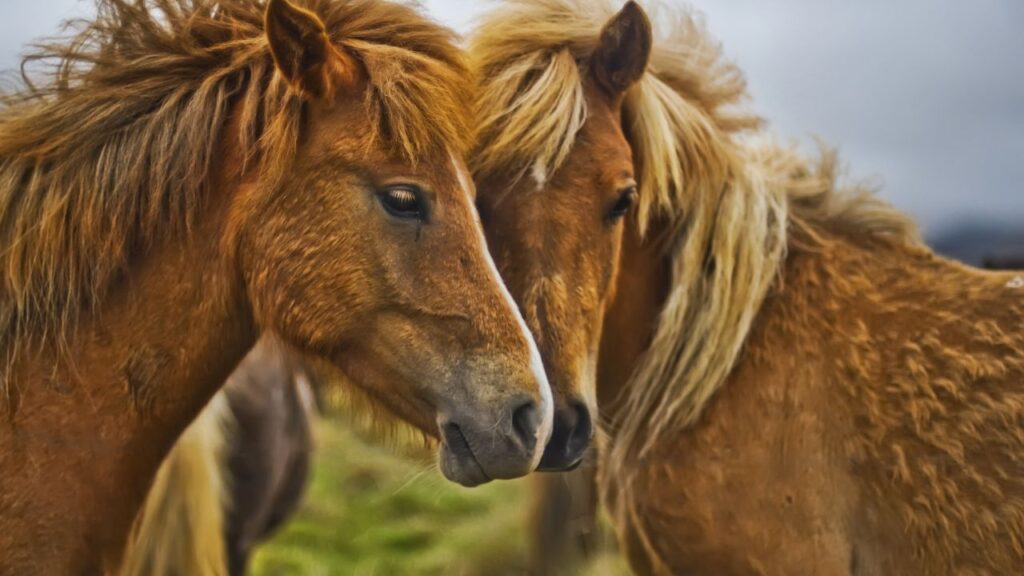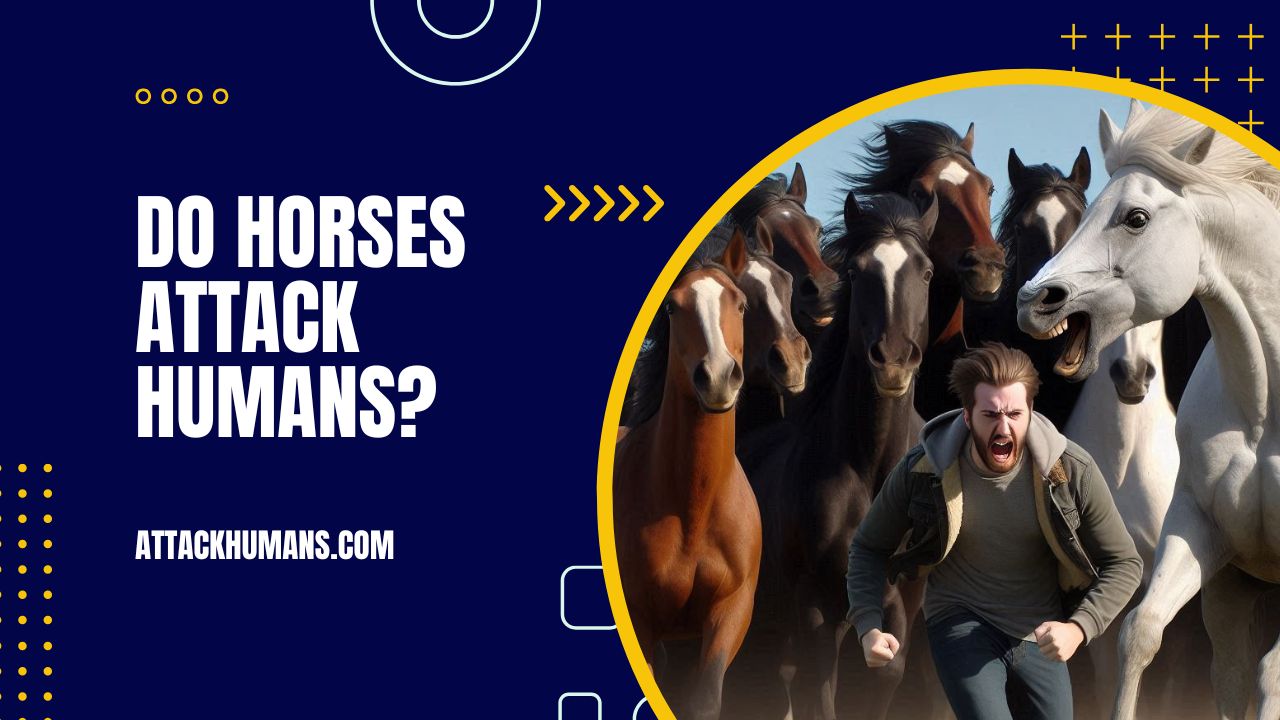Do Horses Attack Humans? Horses generally do not attack humans intentionally, but they may react defensively if they feel threatened or startled.
Horses are known for their grace, beauty, and gentle nature, often viewed as loyal companions and invaluable working partners to humans.
However, because of their size and strength, there is an inherent risk when interacting with these majestic creatures.
People who aren’t familiar with horse behavior might wonder if horses are capable of attacking humans intentionally. [Do Horses Attack Humans?]
While horses are typically not aggressive, they can sometimes exhibit defensive behaviors when they feel threatened, startled, or experience pain.
In this article, we will explore whether horses intentionally attack humans, what prompts such reactions, and how to interact with them safely.
Understanding the behavior of horses is key to minimizing the chances of an incident and fostering a positive human-animal relationship.
Contents
Understanding Horse Behavior
Natural Instincts of Horses
Horses are prey animals by nature, which means they have evolved to be highly attuned to their environment, constantly scanning for potential threats. In the wild, horses live in herds where safety comes from numbers.
Their first instinct when they perceive danger is to flee. However, when escape isn’t possible or they feel cornered, they may resort to defensive tactics such as kicking, biting, or even rearing up.
This fight-or-flight response is deeply ingrained in their behavior. When interacting with horses, it’s important to remember that their instinctual reaction to perceived threats is rarely a deliberate act of aggression. Instead, it’s a natural survival mechanism.
Horses that exhibit reactive behaviors are often misunderstood as being aggressive, but in reality, they are simply trying to protect themselves from a situation they don’t understand or can’t control.
Communication and Social Structure
Horses are social animals with a well-defined herd structure. [Do Horses Attack Humans?]
Within a herd, horses communicate through body language, vocalizations, and physical touch. Understanding these social cues is crucial when interacting with horses.
While humans primarily rely on verbal communication, horses depend on non-verbal signals to convey their emotions and intentions.
Key body language cues include:
- Ear Position: Horses move their ears to signal their mood. Pinned-back ears usually indicate anger or discomfort, while forward ears suggest curiosity or interest.
- Tail Movement: A swishing or flicking tail can indicate irritation or agitation, whereas a relaxed, hanging tail signals calmness.
- Posture: A tense or rigid posture suggests the horse is on high alert and might react defensively if approached too quickly.
Learning to interpret these signs can help humans better understand the emotional state of the horse they are interacting with, making it easier to avoid situations where the horse might feel threatened or defensive.
Do Horses Intentionally Attack Humans?
Misconceptions about Horse Aggression
The idea that horses attack humans out of malice or aggression is largely a misconception. Unlike predatory animals such as big cats or wolves, horses do not possess the instinct to hunt or attack others. Instead, their reactions are based on survival instincts.
When a horse kicks, bites, or strikes out, it is usually responding to a situation that makes it feel unsafe, stressed, or in pain. [Do Horses Attack Humans?]
While horses can cause injury to humans, it is rarely due to intentional aggression. In most cases, the horse is simply reacting to stimuli in its environment, such as sudden movements, loud noises, or unfamiliar people or objects.
For example, if a person approaches a horse too quickly from behind, the horse may kick out instinctively to protect itself from what it perceives as a potential threat.
It’s important to note that many “attacks” by horses are accidental or unintentional. A horse might accidentally nip or bite while reaching for food, or it could kick out if startled by something behind it.
These behaviors are not acts of aggression but rather natural reactions to the horse’s environment and the way it interprets various stimuli.
Typical Defensive Behaviors
Horses have several ways of defending themselves when they feel threatened or uncomfortable. [Do Horses Attack Humans?]
These behaviors are often misunderstood as aggression but are actually defensive mechanisms designed to protect the horse from perceived danger. Some common defensive behaviors include:
- Kicking: This is one of the most common defensive actions a horse may take. Horses will often kick out with their hind legs if something or someone approaches them from behind too quickly. Kicking is a natural response for horses when they feel their personal space has been invaded, and it’s their way of warning others to back off.
- Biting: Horses may bite when they feel threatened or uncomfortable, especially if they are being mishandled or experiencing pain. A horse’s bite can be quite strong and painful, but it’s usually a reaction to something that the horse finds upsetting or alarming.
- Rearing Up: When a horse rears up, lifting its front legs off the ground, it is often trying to escape a situation that feels dangerous or overwhelming. This behavior can be intimidating for handlers, but it’s usually a sign of fear or extreme agitation rather than aggression.
- Striking with Forelegs: In rare cases, a horse may strike out with its front legs as a form of defense. This behavior typically occurs when the horse feels cornered and believes it has no other way to protect itself.
Understanding these behaviors and what triggers them can help handlers and riders recognize when a horse is feeling threatened and take steps to calm the animal down before an incident occurs.

Reasons Why Horses May React Aggressively
Fear or Threat Perception
One of the primary reasons a horse may react aggressively is fear. Horses are naturally skittish animals, and their instinct is to run from perceived danger.
However, when they feel trapped or cornered, they may lash out defensively. Fear can be triggered by sudden movements, loud noises, unfamiliar people, or unfamiliar environments.
For example, if a horse is suddenly approached from behind without warning, it may kick out in fear. [Do Horses Attack Humans?]
Likewise, if a loud noise, such as a car backfiring or a barking dog, startles the horse, it may react by bolting or kicking.
In these cases, the horse is not being aggressive; it’s simply responding to a situation that it finds frightening or overwhelming.
Pain or Discomfort
Horses are large, powerful animals, but they are also sensitive to pain and discomfort. [Do Horses Attack Humans?]
If a horse is in pain due to an injury, illness, or poorly fitted equipment, it may react defensively when touched or handled.
For example, if a saddle doesn’t fit correctly and causes pressure on the horse’s back, the horse may bite, buck, or rear in response to the discomfort.
It’s important to regularly check a horse’s health and equipment to ensure that it is not experiencing any pain or discomfort.
Addressing these issues can significantly reduce the likelihood of defensive behaviors and make the horse more relaxed and cooperative.
Poor Handling or Training
Another reason a horse may react aggressively is poor handling or inadequate training. Horses are highly trainable animals, but they require consistent, positive reinforcement to learn proper behavior.
When horses are mishandled or trained with harsh methods, they may become anxious, fearful, and more likely to react defensively.
Handlers who lack experience may inadvertently provoke a defensive response by approaching a horse too quickly, standing in its blind spot, or using inappropriate equipment.
In these situations, the horse may kick, bite, or otherwise react in self-defense. [Do Horses Attack Humans?]
Proper training and handling techniques are essential for building trust between humans and horses, ensuring safe and positive interactions.
Preventing Horse-Related Incidents
Learning Horse Body Language
One of the most effective ways to prevent horse-related incidents is to learn how to read a horse’s body language. [Do Horses Attack Humans?]
Horses communicate their emotions through subtle changes in posture, facial expressions, and movements.
Recognizing these cues can help you understand when a horse is feeling stressed, agitated, or frightened, allowing you to take steps to calm the animal before it reacts defensively.
Some key body language cues to watch for include:
- Ears pinned back: A sign of irritation or discomfort. If a horse’s ears are flat against its head, it may be preparing to bite or kick.
- Tense posture: A horse that is standing rigidly with its muscles tensed is likely on high alert and may react defensively if approached.
- Swishing tail: A tail that is flicking or swishing back and forth can indicate frustration or agitation.
- Flaring nostrils: Horses may flare their nostrils when they are excited, anxious, or fearful.
By learning to recognize these signals, you can avoid situations where the horse might feel threatened and respond aggressively.
Proper Training and Handling Techniques
Safe handling and proper training are essential for preventing horse-related incidents. When working with horses, it’s important to approach them calmly and confidently.
Avoid sudden movements, and always approach a horse from the side rather than from directly behind, as horses have a blind spot in the rear.
Using positive reinforcement techniques during training can help horses learn to trust their handlers and respond calmly to different situations.
Training should focus on building the horse’s confidence and teaching it to respond appropriately to commands. [Do Horses Attack Humans?]
See Also: Do Tasmanian Devils Attack Humans?
FAQs
Are horses naturally aggressive animals?
No, horses are not naturally aggressive. Most aggressive behaviors stem from fear, pain, or poor handling. [Do Horses Attack Humans?]
What should I do if a horse seems aggressive?
If a horse appears aggressive, give it space and avoid making any sudden movements. Stay calm, and try to assess the situation. If you’re unsure, consult a more experienced handler for guidance.
Can horses be trained to stop defensive behaviors?
Yes, with proper training and positive reinforcement, horses can learn to stop defensive behaviors and become more confident and cooperative. [Do Horses Attack Humans?]
Why do horses sometimes bite or kick people?
Biting and kicking are defensive behaviors that horses may use if they feel threatened or are in pain. These actions are not meant to be aggressive but are natural responses to perceived danger.
How can I stay safe around horses?
To stay safe around horses, learn to read their body language, approach them calmly, and use proper handling techniques. Always respect the horse’s personal space and avoid making sudden movements.
Conclusion: Do Horses Attack Humans?
While horses are generally gentle animals, they may react defensively when they feel threatened, uncomfortable, or in pain.
By understanding horse behavior, learning to recognize signs of stress, and following safe handling practices, you can greatly reduce the risk of incidents and foster positive, respectful interactions with these magnificent creatures.
Ultimately, the key to a successful relationship with a horse lies in patience, observation, and respect. [Do Horses Attack Humans?]
By taking the time to understand a horse’s natural instincts and behaviors, you can build a foundation of trust and enjoy a rewarding partnership with these incredible animals.

Hello, I am Rosa Ellis, a mother of two and a wildlife blogger. I grew up in New York City, but I love exploring forests. I’ve traveled to places like Yellowstone National Park and the Amazon Rainforest to see animals up close. I know a lot about animal behavior and which animals can be dangerous to humans. Thanks for visiting my blog!

